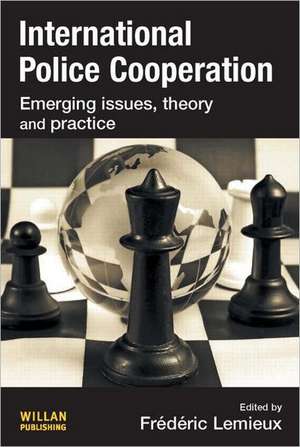International Police Cooperation: Emerging Issues, Theory and Practice
Editat de Frederic Lemieuxen Limba Engleză Paperback – 2010
This book sets out to analyse the key emerging issues and theory and practice of international police cooperation. Paying special attention to the factors that have contributed to the effective working of police cooperation in practice and the problems that are encountered, this book brings together original research that examines opportunities and initiatives undertaken by agencies (practices and processes introduced) as well as the impact of external legal, political, and economical pressures.
Contributors explore emerging initiatives and new challenges in several contexts at both national and international levels. They adopt a diversity of approaches and theoretical frameworks to reach a broader understanding of current and future issues in police cooperation. Forms of police cooperation and trends in crime control are examined, drawing upon the following disciplines: criminology, ethics, organizational science, political science, and sociology.
| Toate formatele și edițiile | Preț | Express |
|---|---|---|
| Paperback (1) | 493.52 lei 6-8 săpt. | |
| Taylor & Francis – 2010 | 493.52 lei 6-8 săpt. | |
| Hardback (1) | 1012.10 lei 6-8 săpt. | |
| Taylor & Francis – 2010 | 1012.10 lei 6-8 săpt. |
Preț: 493.52 lei
Nou
Puncte Express: 740
Preț estimativ în valută:
94.44€ • 98.00$ • 78.94£
94.44€ • 98.00$ • 78.94£
Carte tipărită la comandă
Livrare economică 17-31 martie
Preluare comenzi: 021 569.72.76
Specificații
ISBN-13: 9781843927600
ISBN-10: 1843927608
Pagini: 384
Dimensiuni: 156 x 234 x 25 mm
Greutate: 0.71 kg
Ediția:1
Editura: Taylor & Francis
Colecția Willan
Locul publicării:Oxford, United Kingdom
ISBN-10: 1843927608
Pagini: 384
Dimensiuni: 156 x 234 x 25 mm
Greutate: 0.71 kg
Ediția:1
Editura: Taylor & Francis
Colecția Willan
Locul publicării:Oxford, United Kingdom
Cuprins
1. The Nature and Structure of International Police Cooperation: An Introduction 2. Police and Judicial Cooperation in Europe: Bilateral versus Multilateral Cooperation 3. Towards a Governance Model of Police Cooperation in Europe: The Twist Between Networks and Bureaucracies 4. A Market-oriented Explanation of the Expansion of the Role of Europol: Filling the Demand for Criminal Intelligence Through Entrepreneurial Initiatives 5. Iterative Development of Co-operation within an Increasingly Complex Environment: Example of a Swiss Regional Analysis Centre 6. The Meuse-Rhine Euroregion: A Laboratory for Police and Judicial Cooperation in the European Union 7. Convergent Models of Police Cooperation in Anti-organized Crime and Anti-terrorism Activities 8. The France and Europol Relationship: Explaining Shifts in Cooperative Behaviour 9. Parallel Paths and Productive Partners: The EU and US on Counter-terrorism 10. Cross-strait Police Cooperation between Taiwan and China 11. Police Cooperation in the Context of Peacebuilding: Observations from African Quarters 12. Police–Military Cooperation in Foreign Interventions: Timor-Leste and the Solomon Islands 13. International Police Organizations: The Missing Link to Cooperate Effectively 14. Tackling Transnational Drug Trafficking Effectively: Assessing the Outcomes of the Drug Enforcement Administration's InternationalCooperation Initiatives 15. Challenges of Governance and Accountability for Transnational Private Policing 16. The Constabulary Ethic Reconsidered
Notă biografică
Frederic Lemieux is Associate Professor of Sociology and Director of the Police Science Programme at George Washington University.
Descriere
This book sets out to analyse the key emerging issues and theory and practice of international police cooperation. Contributors explore emerging initiatives and new challenges in several contexts at both national and international levels.













